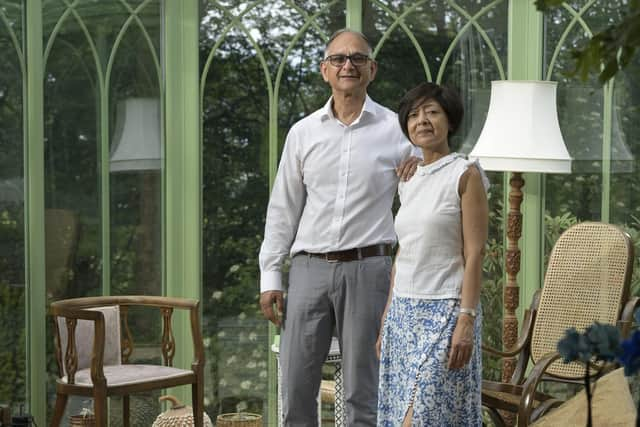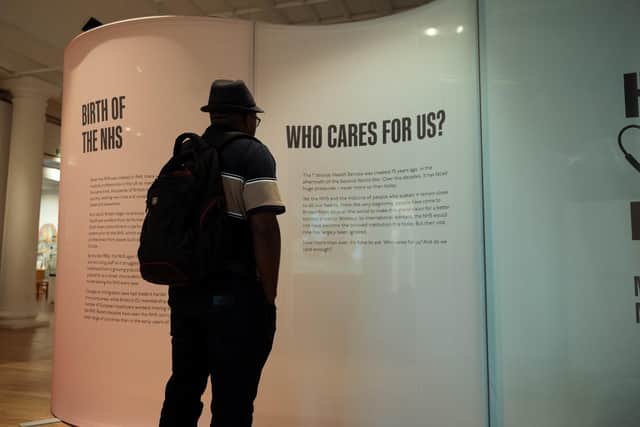'Without migrants, the NHS wouldn't exist' - New exhibition in Leeds shines light on vital role of migration for health service
The pair of paediatricians from India had met on their first day of medical school in Kolkata and after finishing their postgraduate training, were mulling over their next steps. Many of their friends had travelled to the UK for experience working in the NHS and Arnab’s father was keen for them to do the same. A professor at an engineering college, he had studied for his PhD in Sheffield in the 1950s and found that time overseas had broadened his horizons.
“It stuck with us that he wanted us to go so we decided to do that and see where it would take us,” Arnab reflects. Bar three years in the late 1990s when they worked to set up a hospital in the Indian city of Howrah, it led them both into working with the NHS from their arrival in 1992 right through to their retirement earlier this year.
Advertisement
Hide AdAdvertisement
Hide AdThe couple’s experience is one of several stories featured in a new Leeds exhibition highlighting the role of migrants within the NHS. The Heart of the Nation: Migration and the Making of the NHS is a national touring exhibition from the Migration Museum, created to mark the 75th anniversary year of the NHS. It is currently on display in a pop-up museum in Trinity Leeds shopping centre.


Ever since the NHS’s creation in 1948, people have come to the UK from all over the world to work within it and today, around one in six staff have a non-British nationality. Featuring dozens of personal stories, Heart of the Nation shares the experiences of the migrant healthcare workers who built and have sustained the health service from the 1940s to the present day.
Arnab says: “I think for all of us in the UK, we hold the NHS very dearly and part of the NHS history is woven into the history of migration. A lot of people right from the start of the NHS have been people who have come from different parts of the world…This is a nice way of reflecting the values of the NHS and telling the stories of some of those who have contributed to it.”
Arnab spent a large part of his career as a consultant community paediatrician in Leeds, specialising in neurodevelopmental conditions and childhood disability. He also contributes to the degree course in child health at the University of Leeds. The Bradford Royal Infirmary, meanwhile, was Sunita’s main workplace as a consultant neonatologist. She spent years there providing life-saving treatment to newborn babies.
Advertisement
Hide AdAdvertisement
Hide Ad“We were very well treated by the NHS and constantly impressed by the quality of care that was provided,” Arnab reflects in the exhibition. “It was and is in stark contrast to the government-led healthcare system in India. That’s why some colleagues and I wanted to develop something better and more effective in the suburbs of Kolkata [in the late 1990s].”


Sadly, however, Arnab also tells of overt racism during their early years with the NHS. “In the 1990s, it was not uncommon. There would be families where the parents or grandparents would swear at us or tell us not to touch their children...Thankfully times have changed, as back then we’d just walk off and get someone else to treat them...The vast majority of colleagues are extremely distressed if they witness any racist incidents and are very supportive of co-workers who have migrated to the UK to join the NHS: the camaraderie, love and affection across the staff is incredible.”
The Seal’s story is featured in the exhibition alongside others of West Yorkshire-based NHS workers including Gloria Hanley, a community midwife born in St Kitts who moved to the UK aged 18 and worked for the NHS in Leeds for more than 50 years; and the Dimov family, originally from Bulgaria via New Zealand, five of whom – spanning two generations – now work for the NHS.
Aditi Anand, artistic director at the Migration Museum, says: “The NHS simply wouldn’t exist without the generations of people from all over the world who have built, grown and staffed it. Heart of the Nation highlights the vital role that migrants have always played in the NHS and the extent to which, just like the NHS, migration is central to the very fabric of who we are in Britain – as individuals, as communities and as a nation. Now more than ever, this is a story that needs to be told.”
The exhibition is on at Trinity Leeds until February 2024.
